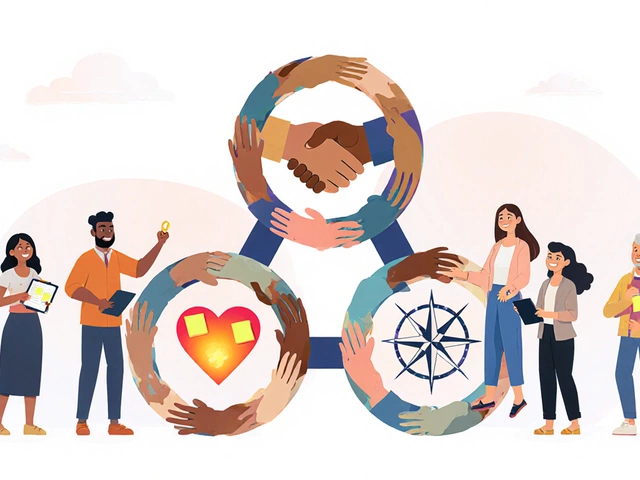Imagine a world where every individual, irrespective of their background, has equal access to resources and opportunities. Community outreach workers strive to make this vision a reality. These unsung heroes work tirelessly to connect people with the services they need, bridging gaps that often seem insurmountable.
In this role, outreach workers wear many hats; from listener and advocate to educator and connector. They delve deep into communities, uncovering needs that may not be immediately evident, and finding innovative ways to meet those needs.
It's not just about providing services. It's about fostering trust and empowering individuals, making them active participants in their own journey towards growth. The dedication of community outreach workers sparks change, creating ripples that lead to stronger, more resilient communities.
- Defining Community Outreach Roles
- The Skills and Qualities of Successful Outreach Workers
- Community Engagement Strategies
- Challenges Faced by Outreach Workers
- Impact of Outreach Work on Communities
Defining Community Outreach Roles
In a world where diverse communities face multifaceted challenges, the role of a community outreach worker is both critical and dynamic. These professionals are the bridge between service providers and the community, often acting as the first point of contact for individuals seeking support. Their mission is to engage with marginalized and underserved populations, identifying their unique needs while connecting them to vital resources. This can range from medical and educational services to employment and housing support. Each day, outreach workers walk alongside those in need, hoping to inspire change, foster resilience, and stimulate growth within communities.
The essence of the role lies not just in service delivery but in building trust-based relationships. Outreach workers spend time building rapport with community members to understand their struggles deeply. They employ active listening skills, offering empathy and compassion where it's often scarce. By doing so, they create a safe space where individuals feel valued and understood. These workers also serve as advocates, lending their voices to those who may feel voiceless, challenging the systemic barriers that often prevent access to basic human rights.
Community outreach work is an art of adaptation. Outreach workers possess the skill to tailor their approach to fit the unique cultural and social backgrounds of the populations they serve. This requires cultural sensitivity and awareness, ensuring respect and understanding are at the forefront of every interaction. Their role also encompasses data gathering and analysis, using insights to develop targeted programs that address the root causes of systemic issues. Therefore, they play a crucial part in both immediate relief efforts and long-term community development plans.
While the role is often rewarding, it doesn't come without its challenges. Outreach workers frequently navigate resource constraints, and must remain tenacious amidst bureaucratic hurdles. Many face emotional exhaustion, given the nature of stories shared and the depth of distress witnessed. Yet, these professionals preserve hope, driven by the belief that each small victory contributes to a broader impact. As famed humanitarian Nelson Mandela once said,
"What counts in life is not the mere fact that we have lived. It is what difference we have made to the lives of others that will determine the significance of the life we lead."
In many cases, outreach workers also act as educators, hosting workshops and seminars to educate the community on various health, safety, and wellness topics. They handle everything from organizing events to ensure widespread community engagement to developing informative resources that empower individuals to make informed decisions. They often work in tandem with other professionals, such as social workers, healthcare providers, and community organizers, to maximize their reach and effectiveness. This collaboration underscores the importance of a united approach where every member involved plays a part.
The Skills and Qualities of Successful Outreach Workers
Being a successful outreach worker requires a unique blend of skills and personal qualities. First and foremost, empathy is at the heart of this profession. Outreach workers often engage with individuals who are facing significant challenges, such as homelessness, addiction, or domestic violence. These challenges require the outreach worker to listen intently and respond with compassion and understanding. Effective communication is also crucial. It's imperative for outreach workers to convey information clearly, whether they are explaining resources available to someone in need or advocating on behalf of a community to policymakers.
Another essential skill is cultural competency. Community outreach often involves working with diverse populations, each with its own customs, languages, and beliefs. Successful outreach workers respect and appreciate these differences, tailoring their approach to each individual or group. This adaptability is what often allows them to build trust and form meaningful connections. Patience and perseverance also play vital roles, as changes within communities or individual cases can be slow to manifest.
Problem-solving skills are critical for outreach workers because they frequently encounter complex and multifaceted issues. They need to think on their feet, develop strategies that are both creative and practical, and sometimes make decisions rapidly. An outreach worker should have a solid understanding of the social services available in their community so they can effectively bridge the gap between those services and the people who need them the most.
"The best way to find yourself is to lose yourself in the service of others." — Mahatma Gandhi
Time management and organization cannot be overlooked. Outreach workers often juggle numerous cases and must ensure they give each the attention it deserves while coordinating with other service providers. This requires them to be adept at maintaining detailed records, setting priorities, and managing their workload efficiently. A strong network within the community is a significant asset, enabling them to connect individuals with the right services and support systems promptly.
Finally, a passion for advocacy rounds out these skills and qualities. Outreach workers serve not only as resources but also as champions for their communities. They strive to amplify the voices of those they serve, influencing policy changes that can lead to more equitable and accessible social structures. Passion and dedication drive outreach workers to continue their efforts, even amidst the challenges, making a lasting impact on the community and the lives they touch.

Community Engagement Strategies
Community engagement is at the heart of effective outreach work. It involves building relationships, fostering trust, and creating partnerships to address community needs. One of the primary strategies involves active listening and open dialogue. Outreach workers must dive deep into the fabric of the community, attending local events, community meetings, and informal gatherings. By doing so, they gain firsthand insights into the challenges faced by community members, which helps tailor the outreach efforts effectively.
An effective strategy is leveraging local leaders as allies. These leaders, who are already trusted figures within the community, can act as bridges between outreach workers and community members. Building partnerships with these leaders helps in promoting initiatives and ensuring the message reaches the intended audience. By investing in these relationships, outreach workers amplify their own credibility and influence.
Education and awareness campaigns play a crucial role in community engagement. Outreach workers design programs that inform the public about available services and resources. By utilizing various media, such as social platforms, local newspapers, and radio broadcasts, they ensure that the information reaches a wide audience. Creative workshops and interactive sessions are often organized to engage community members in a lively and inviting manner. A successful campaign not only informs but also invites participation, sparking conversations and discussions that promote community involvement.
A vital component of community engagement is the inclusion of technology. In today's digital age, utilizing social media platforms and creating virtual communities can extend the reach of outreach efforts significantly. By engaging with community members online, outreach workers can provide real-time assistance and updates. This digital approach complements traditional on-ground activities and provides an added layer of connectivity, especially useful in reaching younger demographics.
It's important to acknowledge the diversity present within communities. Tailoring strategies to accommodate different cultural backgrounds and languages is crucial. Outreach workers often collaborate with translators and cultural mediators to ensure that engagement activities are inclusive and considerate of all community members. This not only facilitates better communication but also demonstrates respect and understanding towards cultural differences.
Evaluating and adapting strategies is an ongoing process. Outreach workers regularly assess the effectiveness of their methods and remain flexible to change. They gather feedback from community members, analyze outcomes, and adjust their approaches accordingly. This iterative process ensures that their strategies remain relevant and effective in meeting the ever-evolving needs of the community.
"True community engagement is not about talking at people, but talking with them. It's about breaking down barriers, creating open channels, and walking the path of change together," notes respected community activist Marielle Heller. Her words resonate deeply with outreach workers who prioritize collaboration over deliverance.
In conclusion, community engagement is a multifaceted endeavor requiring creativity, patience, and an unwavering commitment to inclusion. Outreach workers employ a variety of strategies to connect with diverse community groups, fostering an environment of trust and collaboration. Through effective engagement, they work towards empowering communities and driving sustainable change.
Challenges Faced by Outreach Workers
Community outreach workers find themselves navigating a landscape filled with numerous challenges, each shaping their approach and dedication to the job. One of the primary hurdles is dealing with insufficient resources. Many organizations offering social services operate on tight budgets, meaning outreach workers often have to do more with less. This can create a gap in meeting community needs fully, as they struggle to balance limited funds with growing demands. Securing funding often requires creativity, as workers compete for grants and donations to keep their programs alive.
Another challenge is the inherent diversity of the communities they serve. Every neighborhood and group is different, each with its own unique issues and dynamics. Outreach workers must be incredibly adaptable, quickly learning the socio-cultural nuances of every environment they enter. Building trust in these communities takes time and persistence, particularly in areas marked by high levels of distrust towards external authorities or organizations. Forging genuine relationships means being visible and consistent, listening more than speaking, and constantly proving their commitment to the community's welfare. As noted by a senior outreach coordinator, "Trust can take months to build, but only moments to shatter."
The emotional toll of the work is often underestimated. Constant exposure to the harsh realities many individuals face—poverty, violence, addiction—can weigh heavily on an outreach worker’s mental health. They often shoulder the emotional weight of the people they help, all while trying to maintain their well-being. This emotional strain can lead to burnout, making self-care and peer support networks essential. Despite their dedication, outreach workers sometimes witness setbacks within their communities, which can be incredibly disheartening, and maintaining a positive mindset in such situations is crucial, yet challenging.
Safety concerns also loom large. Many outreach workers operate in environments that are afflicted by crime or instability. This introduces risks that necessitate strict safety protocols, often requiring them to work in pairs or alert local authorities of their presence. Training in conflict de-escalation and awareness of potential dangers becomes part of the job. Although sometimes daunting, outreach workers are generally resilient and resourceful in finding ways to minimize risks while maximizing the impact of their efforts.
Lastly, the technological gap can present obstacles, both in terms of outreach methods and in helping communities access digital resources. As the world advances technologically, those without access to devices or the internet are at a disadvantage. Outreach workers often attempt to bridge this gap, advocating for digital literacy and access to online services. Despite these challenges, the dedication of outreach workers remains steadfast, driven by a commitment to foster public engagement and social equity in every corner of their communities.

Impact of Outreach Work on Communities
Community outreach initiatives hold a transformative power that can uplift not just the individuals directly involved, but the entire communities as well. Community outreach work impacts neighborhoods in several profound ways. Primarily, it facilitates access to vital resources that might otherwise seem out of reach for marginalized populations. This can include anything from healthcare and education to employment opportunities and legal aid. When outreach workers engage with community members, they bring a deeper understanding of local needs, resulting in more tailored and effective service delivery. Their efforts can help dismantle systemic barriers that have long hindered growth and opportunity within their communities.
The presence of dedicated outreach workers can assist in building trust where it has been eroded, particularly in areas where public systems have failed the citizens. By acting as reliable intermediaries between the community and service providers, they ensure that services are not just available, but accessible and utilized by those in need. Their commitment often leads to increases in community engagement and empowerment, as more people find their voices and begin advocating for their rights and needs. This ripple effect of engagement can have long-term benefits, fostering a sense of unity and shared purpose among community members, which is essential for any thriving community.
Another significant impact of community outreach is in the realm of education and awareness. Outreach workers often conduct workshops, seminars, and one-on-one interactions focused on vital topics such as health education, financial literacy, and civic rights. These efforts not only equip individuals with the knowledge they need to navigate complex systems but also motivate them to take an active role in personal and communal development. Increased awareness often leads to public movements that can drive policy changes on larger scales. As more individuals come to understand and harness their power, communities inevitably grow stronger.
In addition to these educational benefits, outreach work also fosters social cohesion and inclusivity. By promoting dialogue and understanding among diverse groups, outreach programs help reduce prejudice and discrimination, creating a more inclusive community environment. The emphasis on inclusivity encourages a richer cultural exchange and deeper mutual appreciation among community members.
According to the United Nations Development Programme, "community outreach initiatives have proven to improve social cohesion and civil participation rates by approximately 25%". This is a testament to the enhancing effect these programs can have on community dynamics.
The economic impact of community outreach can’t be overlooked either. When communities are healthier and more educated, they contribute more robustly to the local economy. By opening up pathways to employment and vocational training, outreach workers help reduce unemployment rates and stimulate economic growth. This economic upswing benefits everyone, as increased financial stability leads to better living conditions, lower crime rates, and a wider tax base for further community improvements. It's a virtuous cycle of growth and improvement, spurred on by the tireless efforts of those dedicated to outreach work.








